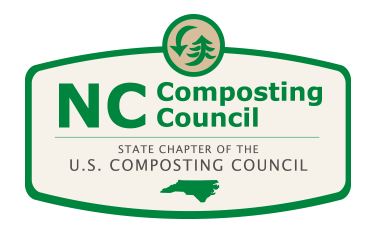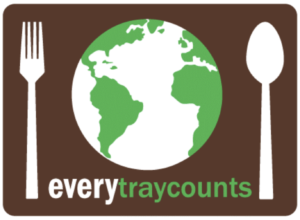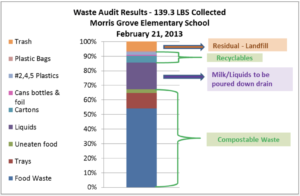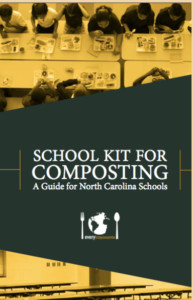When It Comes to School Lunch Waste, Every Tray Counts!
Every Tray Counts is a non-profit organization that aims to take the trash out of public schools and turn it to compost. When Sue Scope and Bing Roenigk first began Every Tray Counts (ETC) in 2013 public schools all across North Carolina were serving their lunches on polystyrene trays. Elementary schools average 4 lbs of food waste per child per month and 100% of it was going to the landfill. With over 1,000,000 K-8 students in NC’s schools, the amount of waste being landfilled is approximately a staggering 18,000 tons in the school year for those schools alone.
Every Tray Counts began with a focus on helping individual schools to use compostable or reusable products and cut back on their lunchtime waste and now is moving whole school systems over to using compostable materials in all of their lunchrooms. Every effort has to start with information, so their strategy is to identify the unique waste disposal capacity within the community and school and develop a program of sustainability tailored to the individual school and the district.
Central to what the group has to assess is the number of meals served to understand how much compostable waste could be expected, then the distance to the nearest composting facility and the logistics of having the compostables hauled there, finally, the amount of interest in the area for running a pilot program is key.
With this information in hand ETC begins by reviewing a school district’s current solid waste contract and helps them to best utilize services like recycling that they may already have available to them. Cost savings on dumpster rentals and the tipping side means there are funds available to spend on compostable food trays instead of the cheaper polystyrene ones. ETC has found they can often change a school over to compostables without affecting them financially while giving them savings on their environmental impact.
Once a school within a district has been selected and evaluated, a pilot program begins. ETC works with the school’s administrators, custodial and kitchen staff, teachers and teaching assistants, parents and, of course, the children. Other community members are also brought in for monitoring lunch times and special events. Schools that have completed the program are seeing a fantastic return for their efforts. After having 100% of solid waste going to a landfill, ETC schools are diverting up to 90% of that waste to recyclers and composters.
Interest in the ETC program and its benefits has blossomed and ETC was having a hard time keeping up, so in 2018 the NC Composting Council gave ETC a grant of $2500 to facilitate the expansion of ETC’s website into an interactive information source for schools and individuals wanting to lighten their student’s environmental impact. The grant also helped with the development of a School Kit which makes the transition to composting simple and clear. The kit provides schools with the information and basic format for assessing its own waste stream and determining the course for change. The kit changes ETC’s involvement with a school from one of implementer of the waste diversion program to advisor.
Every Tray Counts in North Carolina is just one among many organizations in states like Colorado, Maine and Vermont. According to the EPA, Americans recovered over 23 million tons through composting in 2015. This is 0.4 pounds per person per day for composting. ETC’s work significantly improves the amount of compostable waste diverted.
With all of this waste being sent to composting facilities compost manufacturing near the schools is seeing a boost as well. For example, in one school in an average month approximately 1,647 lbs of lunchroom waste becomes 412 lbs of compost. In a landfill these organic materials would have produced 214 lbs of methane; as compost, however, when applied to garden, farm or grassland they can actually serve as a carbon sink (see NCCC’s blog post Compost Combats Global Warming, 11/25/18).
Every Tray Counts is continuing its relationship with the NC Composting Council and other like-minded organizations in an effort to expand its impact in North Carolina by developing a comprehensive composting system for schools.
“Every Tray Counts is at the intersection of public schools and solid waste.” Says Executive Director, Sue Scope, “If we can incorporate a composting program in our lunch rooms and our classrooms, we can have a tremendous impact on our children’s future.”
Julie Moore
![]()










